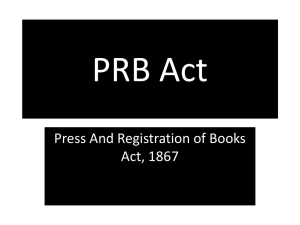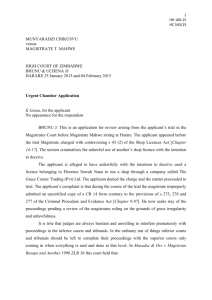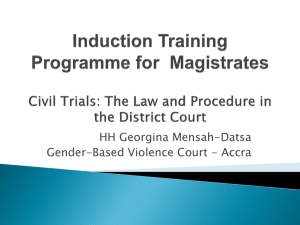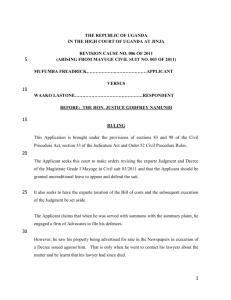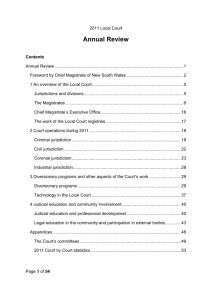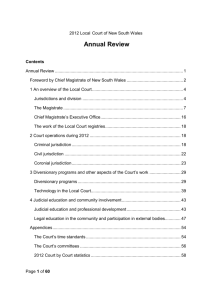Oba osele. v onyait cuthbert & anor 2
advertisement
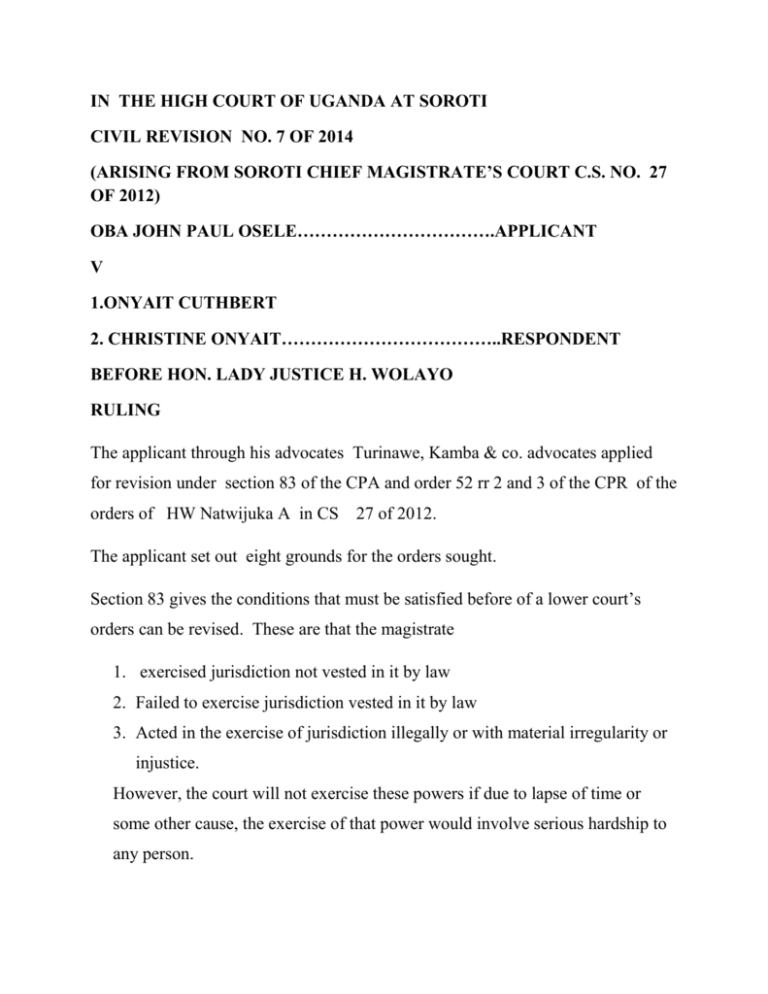
IN THE HIGH COURT OF UGANDA AT SOROTI CIVIL REVISION NO. 7 OF 2014 (ARISING FROM SOROTI CHIEF MAGISTRATE’S COURT C.S. NO. 27 OF 2012) OBA JOHN PAUL OSELE…………………………….APPLICANT V 1.ONYAIT CUTHBERT 2. CHRISTINE ONYAIT………………………………..RESPONDENT BEFORE HON. LADY JUSTICE H. WOLAYO RULING The applicant through his advocates Turinawe, Kamba & co. advocates applied for revision under section 83 of the CPA and order 52 rr 2 and 3 of the CPR of the orders of HW Natwijuka A in CS 27 of 2012. The applicant set out eight grounds for the orders sought. Section 83 gives the conditions that must be satisfied before of a lower court’s orders can be revised. These are that the magistrate 1. exercised jurisdiction not vested in it by law 2. Failed to exercise jurisdiction vested in it by law 3. Acted in the exercise of jurisdiction illegally or with material irregularity or injustice. However, the court will not exercise these powers if due to lapse of time or some other cause, the exercise of that power would involve serious hardship to any person. Counsel for the applicant listed eight complaints against the learned magistrate that in his opinion, fall within the ambit of section 83 of the CPA. I have read the eight complaints and I will pick out six of these complaints that I believe address the issues at hand. 1. The learned magistrate acted illegally in entertaining objections that did not arise from the pleadings . 2. The learned magistrate acted illegally and with material irregularity in entertaining objections on matters the High Court had dealt with when it issued a warrant for vacant possession on 29.3.2012 in HCCA 15B of 1983. 3. The learned magistrate acted illegally in exercising jurisdiction not vested in him by law when he revisited a matter handled by the High Court. 4. The magistrate acted illegally in determining the suit on preliminary objections that seem to have been proposed by himself and that could not determine all the issues in CS 27 of 2012 without hearing evidence. 5. The magistrate acted with material irregularity when he set aside execution issued by the High Court. 6. The magistrate acted illegally when he awarded 15,000,000/ general damages for torture, suffering and destruction without hearing evidence . The application Is supported by the affidavit of the applicant that I have read and understood. I have also read the affidavit in rely filed by the 1st respondent. Counsel for both parties filed written submissions and authorities that I have carefully considered. Katuntu & Co. advocates appeared for the respondents. The underlying complaint in the eight listed is that the magistrate gave judgment in the suit without agreement of both parties to defer calling witnesses, or without the raising of preliminary objections by the respondent/defendant with the result that both parties were denied a fair hearing. I have had occasion to study the record of proceedings. On 11.7.2012, the respondents filed civil suit No. 27 of 2012 wherein they sought the following orders: 1. A declaration that the suit land is the property of the respondents 2. A declaration that the applicant’s eviction of the respondents from the suit land was forceful, illegal and therefore null and void ab intio. 3. A permanent injunction forbidding the applicant and his agents from interfering with the suit land 4. General damages. 5. Costs of the suit. In his defence, the applicant defended the eviction and averred that the eviction was enforcement of a judgment in HCCA No. 15B of 1986 wherein the High Court gave judgment in his late father’s favour on 16.8.1986 between Kelementi Okwii and two others v Stanley Obaa. The record shows that on 14.2.2010, Chief Magistrate Acio Julia sealed a decree in CA 15B of 1986. On the same date, she sealed a decree in Chief Magistrate’s court Civil Appeal No. 118 of 1982 between the same parties as in the High Court Civil Appeal. On 13.4.2012, this time, HW Acio, acting in her capacity as Deputy registrar, issued a notice to show cause against execution of the decree in HCCA. 15B of 1986. The notice was issued to the appellants in that appeal, namely, Kelementi Okwii, Leonard Obetel, and Martin Opejo. The warrant for vacant possession was sealed on 16.6.2010, before the decrees were extracted. It seems the eviction took place two years later on 30.5.2012 , long after the warrant for vacant possession issued. On 23.1.2013, the current respondents filed civil application No. 2 of 2013 to strike out the applicant’s defence on the grounds it was not served on them. On 16.4.2014, Mr. Ogire who was by then counsel for the current applicant informed the presiding magistrate HW Natwijuka that Civil Application 2 of 2013 had been determined by consent to the extent that the suit should be heard on the merits. The presiding magistrate then commented that he had seen written submissions on the file and as he had just been allocated the case, he needed time to study the record. On 18.6.2014, Mr. Ogire for the applicant/defendant and Katuntu & Co. advocates appeared before the magistrate and Mr. Ogire informed the court that the case was for judgment, whereupon, the case was adjourned to 2.7.2014 for judgment. On 9.7.2014, a judgment was delivered and a decree issued in the following terms: 1. The execution and eviction of the plaintiffs from the suit land is void ab initio. 2. The plaintiffs are the rightful owners of the suit land. 3. The defendants should vacate the land immediately . 4. A permanent injunction doth issue restraining the defendant , his agents, servants, and successors in title from interfering with the suit land. 5. The plaintiff is awarded 15,000,000/ in general damages. 6. Costs of the suit. From the outset, both counsel were not alive to the fact that in essence, the plaint was challenging the execution issued by the High Court. The right forum for such challenge was the High court and not the magistrate’s court. In the suit, the court was called upon to determine if the eviction was lawful which necessitated the court to examine the process leading to the eviction including the extraction of the decree to be executed and the length of time between the date of judgment and the date the warrant for vacant possession issued. A magistrate’s court does not have jurisdiction to review a decision of a higher court . The right thing to have done would have been to decline jurisdiction and refer the case to the High Court registry under section 18(1) CPA. I therefore find that the magistrate acted without jurisdiction when he set aside execution issued by the High Court. Having found in the affirmative for the applicant, I make the following orders: The judgment and decree of the lower court is set aside for want of jurisdiction. A retrial of this case is ordered before me . The status quo as of the date of this ruling to be maintained until further orders. The Deputy registrar is directed to fix the case for hearing at the earliest. Costs in the cause. DATED AT SOROTI THIS 3RD DAY OF HON.LADY JUSTICE H. WOLAYO FEBRUARY 2015.
